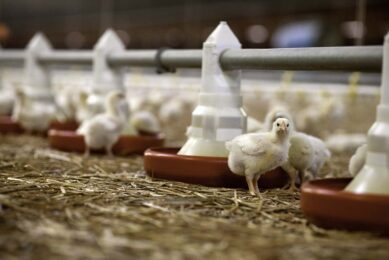Tackling poultry antibiotic overuse in Nigeria

The indiscriminate use of antimicrobials to prevent and treat bacterial infections in poultry is prevalent in Nigeria and other developing countries. These antimicrobials are readily available over the counter and are commonly administered in the form of medicated feedstuffs.
In Nigeria, as in other developing nations, there is a notable absence of any routine collection and reporting of antimicrobial prescription data at farm level. Instead, reports on antimicrobial consumption rely on import data, highlighting a gap in the monitoring and regulation of antimicrobial use in the poultry industry. Given the widespread use of antimicrobials in Nigerian poultry, we will delve into the reasons behind this practice and its implications, focusing on the high level of antibiotic use in the industry.
The prevalence of antibiotic misuse in Nigerian poultry is rooted in the absence of well-defined protocols and effective antimicrobial stewardship. Recent studies highlight this issue, especially in the Nigeria broiler production value chain, where inadequate biosecurity practices and suboptimal husbandry methods contribute to the reliance on antimicrobial use for disease prevention.
The poultry industry in Nigeria faces a considerable threat from prevalent diseases, such as Newcastle disease, coccidiosis, fowl typhoid and E. Coli infections, prompting a desperate need for solutions. Unfortunately, this urgency often leads to the excessive use of antibiotics for both prevention and treatment.
Exceeding recommendations
A recent report from the states of Plateau and Oyo, where poultry farmers are required to register with the government and maintain large poultry populations (8 million and 12 million, respectively), sheds light on the severity of the issue. The report discloses that 98% of registered poultry farmers in these states administer antibiotic treatments exceeding recommended levels to day-old chicks. This alarming statistic underscores the challenges farmers face with diseases on their farms, emphasising the critical need for targeted interventions and improved biosecurity measures to address antibiotic overuse in Nigerian poultry.
Following this comprehensive report on the states of Plateau and Oyo, a worrying reality surfaced. Despite the fact that 92% of poultry farmers in this region know about antimicrobial resistance and its consequences, they all persist in selling eggs and maintaining production at current levels of antibiotic treatment. This persistence is directly linked to the absence of government support, emphasising not only the limited awareness and understanding of antimicrobial resistance among farmers in Nigeria, but also the immediate need for robust awareness campaigns and sensitisation efforts.
Education and awareness
Despite the potential impact of effective biosecurity practices, there is a notable lack of comprehensive education and awareness initiatives for poultry farmers. The absence of guidance hampers the adoption of crucial measures to mitigate extensive antibiotic use. A significant gap in regulatory enforcement and support hinders the implementation of biosecurity measures.
Without stringent oversight and backing from regulatory bodies, farmers may not be motivated to adhere to biosecurity protocols. A pro-active approach to monitoring and surveillance is needed to deter unauthorised antibiotic use. Enhanced surveillance mechanisms can address instances of non-compliance, fostering a culture of responsible antibiotic use in the poultry sector.
Strengthening regulatory framework
Establishing robust regulatory frameworks is essential to control antibiotic use in the poultry industry. Strengthening existing regulations and introducing new guidelines can provide a solid foundation for responsible antibiotic management. Providing support for adopting innovative and sustainable farming practices is critical to transitioning away from the reliance on antibiotics. Financial incentives, subsidies and technical assistance can encourage farmers to embrace and implement environmentally-sustainable methods that promote the health of poultry and consumers.
A recent study has uncovered a troubling trend among poultry farmers in Nigeria, revealing the widespread use of 5 classes of antibiotics (tetracycline, penicillins, aminoglycosides, polypeptides and fluoroquinolone) for the prophylactic treatment of day-old chicks. More alarmingly, certain antibiotic products contain excessive concentrations of active ingredients, such as neo-furaseryl, floricol, and furamycin, not reported in the registered antimicrobials submitted to the World Organization for Animal Health. These findings underscore the urgent need for comprehensive measures to address antibiotic misuse in Nigerian poultry.
In a broader global context, it is crucial to understand the serious repercussions of such practices, affecting both animal and human health, as emphasised by the World Health Organization.
Global impact
According to the World Health Organization, the excessive use of antimicrobials in humans, animals and plants is a primary driver in drug-resistant pathogen development. It estimates that antimicrobial resistance was directly responsible for 1.27 million deaths in 2019, underscoring the urgent need for effective antimicrobial management to safeguard both poultry and public health. The prevalent use of antibiotics in Nigerian poultry contributes to the emergence of antibiotic-resistant strains among poultry populations. This poses a significant risk as these resistant strains can compromise the effectiveness of antibiotics in treating diseases.
The extensive use of antibiotics leaves residues in poultry products, raising concerns about the safety of these food items for consumers. Residual antibiotics may persist in meat and eggs, potentially reaching consumers and contributing to the broader issue of such residues in the food supply. The presence of antibiotic residues and the potential contamination of poultry products contribute to elevated risks of foodborne illnesses among consumers. Consuming products with antibiotic residues may lead to adverse health effects, necessitating a re-assessment of the overall safety of poultry products in the Nigerian market.
In conclusion, increasing awareness among poultry farmers about the critical role of biosecurity, implementing preventive measures, like vaccinations, and advocating for probiotics, can significantly minimise disease incidence on farms, consequently reducing antibiotic usage. Moreover, conducting extensive awareness campaigns and sensitisation efforts targeting private veterinarians and poultry medication suppliers regarding the dangers of antimicrobial resistance is imperative. Underlining to farmers the necessity of prescribing on the basis of laboratory test results before administering antibiotics is a pivotal step in mitigating the adverse effects of AMR.
Join 31,000+ subscribers
Subscribe to our newsletter to stay updated about all the need-to-know content in the poultry sector, three times a week. Beheer
Beheer











 WP Admin
WP Admin  Bewerk bericht
Bewerk bericht